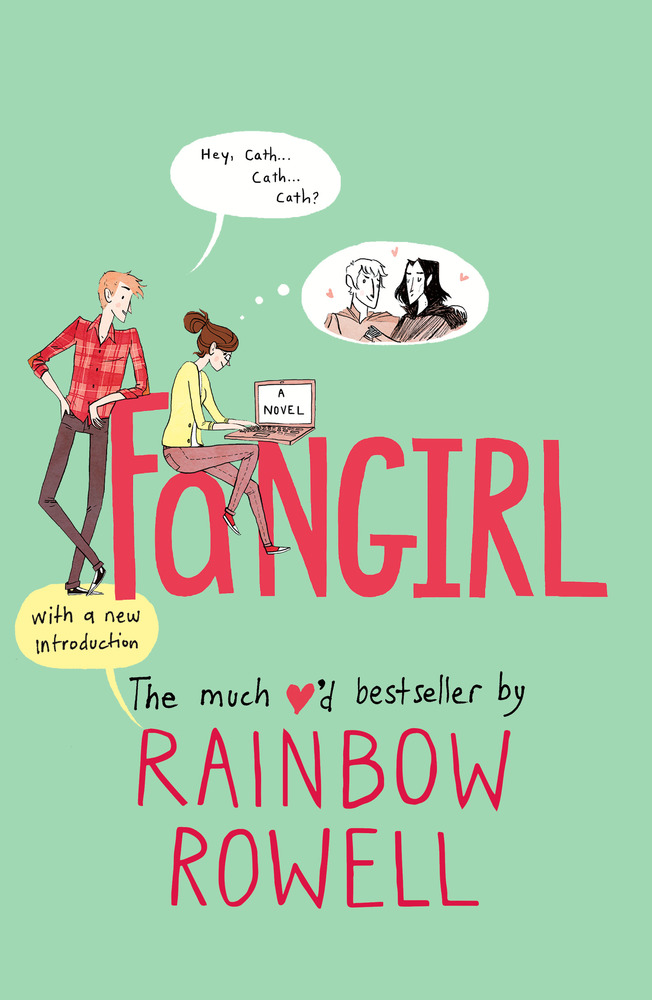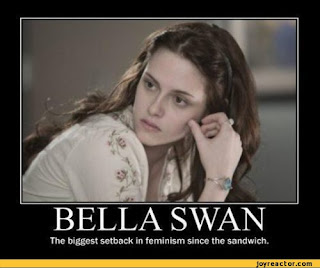...or maybe not...
Stephenie Meyer's series of books about a teenage vampire falling in love with a human are immensely popular, and also rank among the most banned or challenged books in the country. Why are these books that are sometimes referred to as "mind candy" and that really do have so much
not to like about them, still so popular? Even among feminists like me.
I took my first women's studies course (Women and the Media) in the early 1980s at the University of Maryland Baltimore County. One of my classmates talked about her 13-year old daughter reading
Young Miss and
Seventeen magazines and said these magazines made clear the messages about body image and gender stereotypes that we'd been discussing in class. "I can't believe you let your daughter read that stuff" retorted another (childless) classmate, immediately putting the first woman on the defensive (way to go, Sisters!). That was the first time I heard the "why would you let your daughter read that crap?" question, but it certainly wasn't the last. I have heard it many times in the 30 years since the incident took place, and thought about it quite a bit, especially in the last 16 years, since I became the parent of a daughter myself. I have never been asked the question directly, but I have heard it asked about the
Twilight books. So without getting too defensive, here is my response.
When my daughter was first learning to read, she noticed a sign in our local public library that said that all library records were private regardless of the patron's age (I'm paraphrasing). My first grader could read the words, but did not understand their meaning and asked me about it. I explained to her it meant that she could check out whatever book she wanted whenever she wanted, and neither I, nor her father, nor anyone else could find out. The sign, of course, was there for me, not for her. It was there to let
me know that if I wanted to know what my child was reading I should accompany her to the library. Of course, my six-year old wasn't likely to be going to the library by herself anyway. But, as a pre-teen she did start going by herself, and I was happy we lived in a place that had a library my daughter could walk or bike to on her own. She is a voracious reader, and I have always told her that she could read whatever she wanted, whenever she felt ready to read it. Because here's the thing I knew: children want to read things that interest them. She didn't read novels about teenagers having sex, or sucking blood, or taking drugs, or skipping school when she was in elementary school because those things were not part of her reality at the time, and books with those themes generally aren't written for young children anyway. She wanted books about animals, and babies, and friends playing together and sharing. When she was old enough to read Young Adult novels I was glad for her to be able to explore difficult or disturbing subjects through the safe venue of books. I sometimes asked her about books she was reading, but I didn't pry. Sometimes I suggested books she might like, which she sometimes actually read. One of my suggestions, in fact, was the
Twilight series. Our whole family has traveled to Transylvania and we are fascinated with vampire lore. My daughter and I both read the entire series, and the whole family has seen all the movies (the books are way better, btw). Here's my dirty little secret: I like them. No, I didn't find them to be exceptionally well written, or to have especially deep or complex story lines. I do like the way Meyers built up the sexual tension (and was completely let down when Mr. and Mrs. Edward Cullen finally consummated their relationship). And I like the fact that the
Twilight books are a mindless read in an otherwise complicated world; I like that I had something I could talk to my daughter and her friends about. My daughter does not share much about her life with me, much to my chagrin, so when I find something we can bond over, I take it, even a sucky (pun intended) novel. It turns out something we have in common is we both read and enjoyed the
Twilight series when it was all the rage to do so. We got caught up in a movement, and it was fun. Here's an even nastier little secret about me: I'm on "Team Edward" and I think people on "Team Jacob" should have their heads examined.
Earlier this year, I told my daughter she might like to read
Beautiful Creatures (
see yesterday's blog post), as it would probably be of interest to those who also like stories about sparkly vampires. "I think I'm done with sparkly vampires" she answered. Later that week I found her
Twilight poster in the garbage. She is maturing. There are other things she wants to read. Things that are more sophisticated, and more interesting to a sixteen-year old.
So just what kind of a feminist do I think I am, anyway, extolling the virtues of a trashy novel that is rather dis-empowering to women, and "letting" my daughter read them, to boot. I am a feminist who knows that young women are smart enough to make their own decisions about what to read, and then to distinguish fantasy from reality. A feminist who knows that girls are completely competent to read something and then contextualize it, and critique it, and discuss issues such as stalking; and whether girls need a boyfriend to protect them, or make them complete. A feminist who is not afraid to discuss dating and sex with my daughter, much to
her chagrin! I did not "let" my daughter read
Twilight. She is an incredibly intelligent young woman who can make choices for herself. I also know that if I tried to tell her she wasn't allowed to read it, that she would have found a way to read it. Parents who think they can forbid their teenagers from reading something are completely fooling themselves.
I've talked to her about fantasized aspects of this book, especially regarding sex. For instance a girl who asks a boy for sex is not going to receive this response: "after we're married" (snort - don't watch this scene while drinking milk!) Another, unlikely scenario: two virgins having sex together for the first time - a magical experience in which the young woman can surely expect to climax - not bloody likely! (again, pun intended). I must admit that it was a nice touch for Edward to make Bella an omelet the next morning, though.
Of real concern, though, is the way libraries are dissed, at least in the first book (which I re-read in order to write this post-I don't like the series enough to have re-read them all, though). The lovely Bella mentions the Forks public library three times. Twice to say how woefully inadequate it is, and once uses as a convenient lie to her hapless father so she can sneak out with her vampire boyfriend.
I wrote this post months ago, and waited until Banned Books Week to publish it. In the meantime I happened upon this
other feminist perspective of the book written by a young adult librarian who likewise points out that we don't give young women enough credit to think for themselves.











